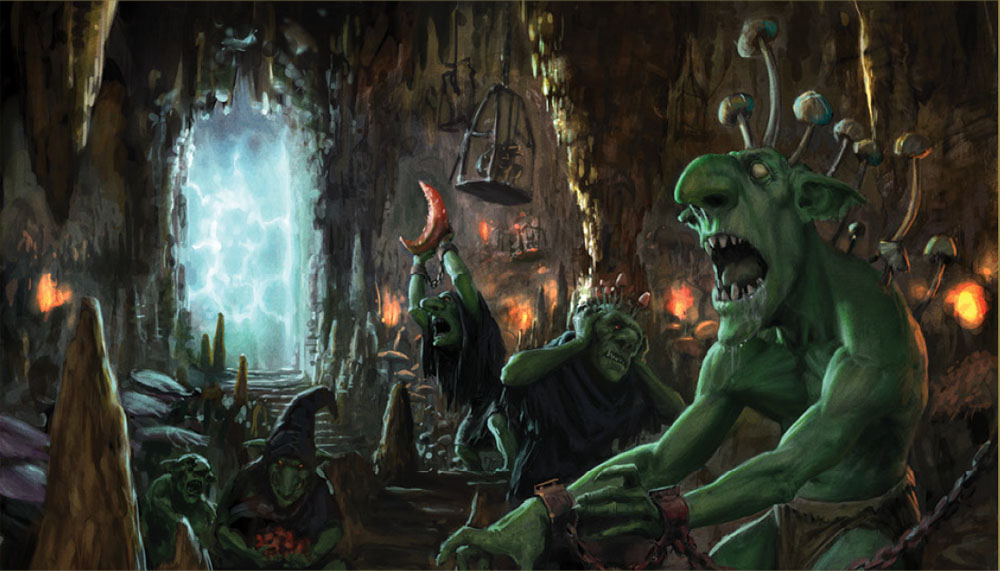The Doom of Pyr Nekheb - House Rules
We've set up some house rules for our Path to Glory campaign, aimed primarily at lengthening the campaign a bit. The proper choice in Path to Glory is always to choose another unit, meaning what's supposed to be a slower paced skirmish game quickly ends up at 1k+ points a side. We've tweaked some Lumineth rules for Peter, and boosted Gloomspite Gits just a bit to bring them in line with other horde factions.
A fair number of these rules are based on The Cambridge Warlords' Path to Glory campaign, with a side of consideration for NinthMusketeer's rework of the faction choices over at The Grand Alliance.

General
- Rather than allowing a choice of either a new unit or buffing an existing unit after each game, players must alternate. After Game 1, a buff must be chosen. After Game 2, a unit. After Game 3, a buff, etc, etc. This is to make the campaign longer and more interesting, while keeping game sizes down. A new unit is pretty much always the right choice, and pretty soon you’re playing full blown games of Age of Sigmar rather than Path to Glory.
- In normal Path to Glory, an elite unit can be picked for 2 Glory (or 1 choice and 1 Glory or 2 choices, whatever). Players have the option of picking a half-strength elite unit for 1 Glory/choice but only if the unit size is divisible by two. Increase your options a little bit, but not so much that it butts up against debates over whether to round up or down. Units which cost 3 Glory/picks are not available for this option.
- A player can “bank” their buff after an odd-numbered game, turning it in after the following game with their troop choice to get an elite (i.e. 1 choice + 1 Glory) unit, rather than spending the Glory. Players can still spend the 1 choice + 1 Glory if they choose.
- Rather than choosing a unit from the proper page, a player can instead choose an Endless Spell they would ordinarily have access to. It follows all normal Endless Spell rules.
- The choice of scenario will go to the player who has played fewer games. All scenarios are available, including those faction specific scenarios in the Battletomes (though you can only pick Battletome scenarios which match your faction, e.g. an Ogre warband can pick something from its Battletome but not something from the Nurgle Battletome). If tied for the number of games played, either roll off or randomize.
- Alternately, and actually recommended, the Open War cards (or Open War charts from the General’s Handbook 2018 if cards aren’t available) will be used to generate a scenario.
- No matter how the scenario is chosen, if a player has played 1-2 fewer games than their opponent, they receive a Ruse card from the Open War cards. If they’ve played 3+ fewer games than their opponent, they receive a Ruse card and a Sudden Death card.
- If at all possible, no player should play more than 3 more games than the player who has played the fewest games (e.g. if Scott has played 1 game and Ian has played 4 games, Ian needs to stop being a nerd and play less until Scott’s caught up a bit).
- Multiplayer games are allowed and encouraged, though not more than every fourth game. All rules for the Triumph and Treachery multiplayer scenarios are in play. The winner of such a glorious battle should get a magic item from their warband’s Battletome.
- The winner is not the first to get to a set number of Glory points but whoever has the most points at the end of the campaign. In our case, at the end of weekend two.
Khorne
- Starts with 2 picks rather than 3.
Lumineth
- Can take great eagles from old High Elf compendium. 1 eagle is 1 pick, and eagles gain -1 rend.
- Zaitrec artifact gives 5+ shrug without Teclis. I'm not taking Teclis. (Normally it's 6+ without Teclis and 4+ with him.)
- Starts with 3 picks rather than 4.
Moonclan Grots
- 1 pick gets 20 Stabbas or Shootas, not 15.


Comments
Post a Comment